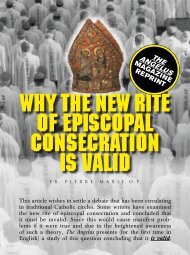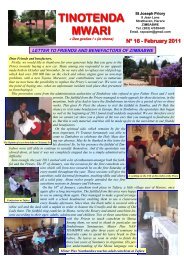Is Feeneyism Catholic? - Society of St. Pius X
Is Feeneyism Catholic? - Society of St. Pius X
Is Feeneyism Catholic? - Society of St. Pius X
Create successful ePaper yourself
Turn your PDF publications into a flip-book with our unique Google optimized e-Paper software.
74 IS F EENEYISM C ATHOLIC?<br />
Obj. 2: Further, in the book De Eccl. Dogm. xli, it is written:<br />
“We believe that no catechumen, though he die in his good<br />
works, will have eternal life, except he suffer martyrdom, which<br />
contains all the sacramental virtue <strong>of</strong> Baptism.” But if it were<br />
possible for anyone to be saved without Baptism, this would be<br />
the case specially with catechumens who are credited with good<br />
works, for they seem to have the “faith that worketh by charity”<br />
(Gal. 5:6). Therefore it seems that none can be saved without<br />
Baptism.<br />
Obj. 3: Further, as stated above (A.1; Q.65, A.4), the sacrament<br />
<strong>of</strong> Baptism is necessary for salvation. Now that is necessary<br />
“without which something cannot be” (Metaph. v). Therefore it<br />
seems that none can obtain salvation without Baptism.<br />
On the contrary, Augustine says (Super Levit. lxxxiv) that<br />
“some have received the invisible sanctification without visible<br />
sacraments, and to their pr<strong>of</strong>it; but though it is possible to have<br />
the visible sanctification, consisting in a visible sacrament, without<br />
the invisible sanctification, it will be to no pr<strong>of</strong>it.” Since,<br />
therefore, the sacrament <strong>of</strong> Baptism pertains to the visible sanctification,<br />
it seems that a man can obtain salvation without the<br />
sacrament <strong>of</strong> Baptism, by means <strong>of</strong> the invisible sanctification.<br />
I answer that, the sacrament <strong>of</strong> baptism may be wanting to<br />
someone in two ways. First, both in reality and in desire; as is the<br />
case with those who neither are baptized, nor wished to be baptized;<br />
which clearly indicates contempt <strong>of</strong> the sacrament, in regard<br />
to those who have the use <strong>of</strong> the free-will. Consequently<br />
those to whom baptism is wanting thus, cannot obtain salvation;<br />
since neither sacramentally nor mentally are they incorporated<br />
in Christ, 102 through whom alone can salvation be obtained.<br />
Secondly, the sacrament <strong>of</strong> baptism may be wanting to anyone<br />
in reality but not in desire; for instance, when a man wishes<br />
to be baptized, but by some ill-chance he is forestalled by death<br />
before receiving baptism. And such a man can obtain salvation<br />
without being actually baptized, on account <strong>of</strong> his desire for baptism,<br />
which desire is the outcome <strong>of</strong> faith that worketh by charity,<br />
whereby God, Whose power is not tied to visible sacraments,<br />
sanctifies man inwardly. Hence Ambrose says <strong>of</strong> Valentinian,<br />
who died while yet a catechumen: “I lost him whom I was to<br />
regenerate, but he did not lose the grace he prayed for.”<br />
102 It is clear from this that, according to <strong>St</strong>. Thomas, baptism <strong>of</strong> desire does<br />
incorporate in Christ, hence makes someone member <strong>of</strong> the Mystical Body <strong>of</strong><br />
Christ, the Church, though the bond is spiritual and not yet complete.











